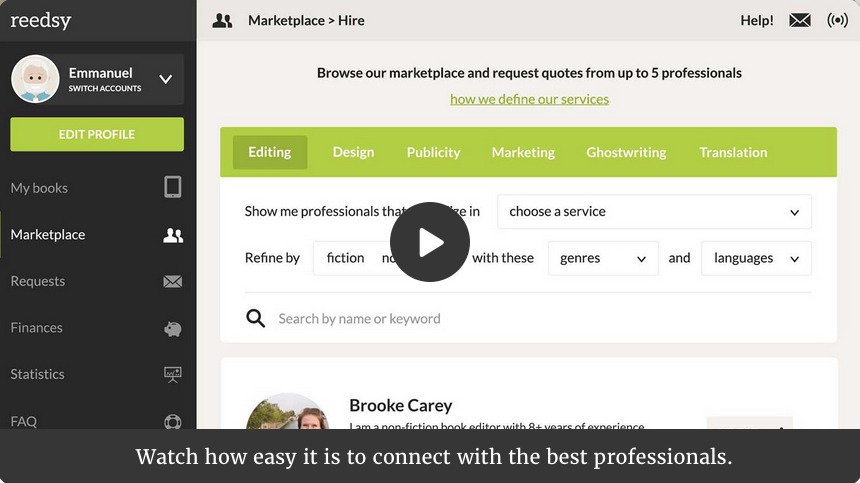
Fact is many of us have ended up writing and blogging for a career almost by accident.
Now, in the early days of the Internet this did not matter much – indeed it almost was an ‘advantage’ to not be a professional. But times have changed and many leading blogs now employ professional writers and editors.
So how is the ‘amateur writer’ but full-time blogger to compete?
Two skills that will make a difference, no matter what your standard of education, is to perfect your editing and proofreading abilities.
But first a couple of thoughts…
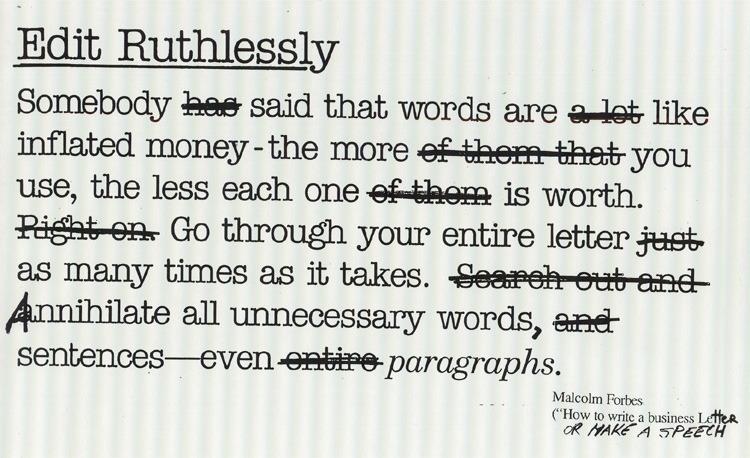
“Perfection is not attainable, but if we chase perfection we can catch excellence” ~ Vince Lombardi
Editing & Proofreading As a Content Marketer
It can be difficult to know where to start or how to maintain the fast-paced world of online content marketing. However, technology is providing plenty of resources to assist writers with the editing and proofreading process.
The most important part of the process is to know how to implement the tools you discover. The impact of your social media content is contingent upon detailed proofreading. Your marketing efforts will be useless if you misspell words, or punctuate incorrectly. You also need to keep an eye on your word usage and grammar so that you do not make the wrong impression with your content.
The editing process can be tedious and overwhelming for some. Writers can often be too close to their content and unable to see certain flaws. And it’s difficult for everyone to spot and correct personal writing mistakes.
Let these editing and proofreading tips along with the resources below be the help you need to take your blogging efforts to the next level.
15 Essential Editing and Proofreading Tips Every Blogger Should Know
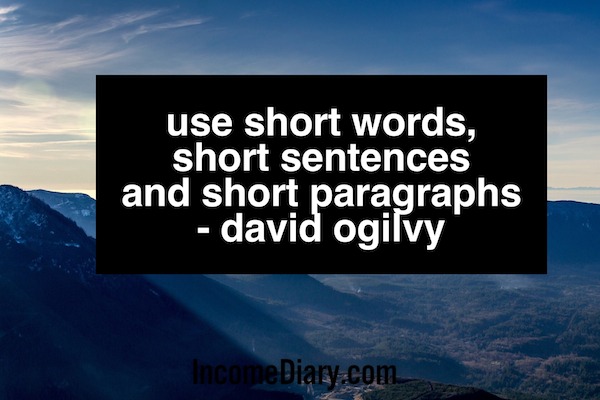
1. Understand that not every mistake is the same.
Marketing writers need to understand how writing for the web is different than an academic essay. Sentence structure, format and punctuation need to be edited accordingly. If you intentionally make a mistake, do so knowing it’s for a good reason. It’s okay to break the rules with online writing, but know why you are doing it and if it’s going to be effective.
Remember back in the early days of SEO, writers would deliberately misspell words in order to rank for that misspelling – nowadays thanks to the intelligence of Google that is no longer necessary – but there may still be an occasion when you deliberately misspell a word – or even as often is the case – invent a word.
This article is not about restricting wacky creativeness, rather it is about writing with purpose and clarity and knowing what it is you want to achieve!
2. Know the difference between editing and proofreading.
There is a slight difference between editing and proofreading. During the editing process you want to revise the content, language and/or structure of your content. And while proofreading you want to fine-tune content and double-check for proper grammar, spelling and punctuation.
3. Research you topic selections thoroughly.
You never want to start writing about a topic without having done the proper research. It’s not enough to just pick a topic and read a Wikipedia page. Marketing content creators need to have spent time exploring the topic, what people are saying about it and how it’s relevant to your brand or current world events. This is also a time to be sure you have proper spelling of names and places, correct data and statistics and factual dates.
4. Review your structure and format.
Structuring and formatting of marketing content is a key element to editing. This stage of the game can make or break your post and it’s engaging impact. Pay close attention to the natural flow of your writing and if it makes sense. Read it out loud and watch out for speaking stumbles or hard to hear sentences. Chances are good they are also hard to read. American author Kurt Vonnegut made this interesting observation:
“As for your use of language: Remember that two great masters of language, William Shakespeare and James Joyce, wrote sentences which were almost childlike when their subjects were most profound. ‘To be or not to be?’ asks Shakespeare’s Hamlet. The longest word is three letters long.”
5. Find supporting references and resources.
Once you have chosen and written about a topic, you want to be sure your content includes supportive references and resources that you discovered while researching. These citations give your article more authority and credit, however you need to be sure they are reputable sources with current and accurate information. They will also help slowly to increase your SEO results, ultimately increasing your marketing efforts.
6. Make sure your all of your content is copyright-free and legal for use.
If your content includes images, videos or other referenced materials, you always need to be aware of copyright laws and availability of used content. There are plenty of sites with free to use images, and if it’s a video created by the content writers themselves, then of course it’s okay to use. Publishing someone else’s work can lead to fines and a damaged reputation, don’t do it.
7. Do not rush and proofread more than once.
Successful marketing content creators always review their work more than a couple times before publishing. Take your time and focus on the process (chances are good you will miss mistakes if you rush) and be sure to give content at least a few, if not more, reviews before publishing.
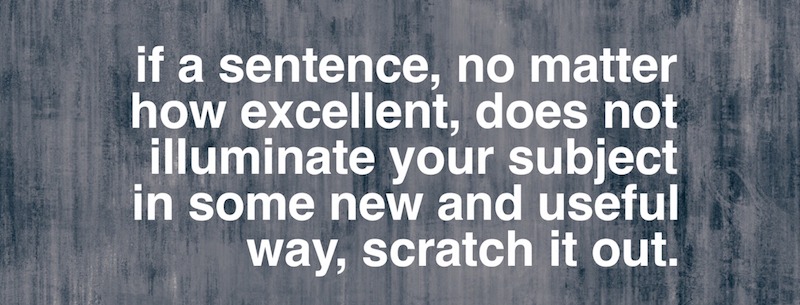
Credit and recommended reading: Kurt Vonnegut’s 8 Keys to the Power of the Written Word
8. Do not rely on your word processor’s spell check.
There are plenty of decent spelling and grammar checking tools available. However, they are rarely the best solution if you want flawless content. Sometimes automated suggestions can even be incorrect, so you need to be educated with English language specifics yourself. And you need to use additional, more complex proofreading tools as well. And always remember no computer or software can replace the human eye. (Not to mention that American English and British English can be quite different!)
9. Make sure you have no distractions.
Shut down all of your browser windows you are not using and sign-out of all social media or online accounts. Turn your phone to silent, or just turn it off. If you normally write to music, or TV, turn them off as well during editing. Sometimes it may even help to print the document you are working on, walk away to make physical corrections, and then return to your device to update your content.
10. When you are proofreading, forget the story.
Once you are beginning to check spelling, punctuation and grammar, take it one sentence at a time. Analyze and break each sentence apart, and do not let your mind focus on the overall story or content (that is something you should be adjusting during the editing stage).
11. Learn your personal common mistakes.
Even the best writers have their natural, habitual mistakes. Often while writing marketers do not focus on spelling and punctuation. It’s a good idea to let your ideas flow and get it all on the page first, then proofread after. And once you begin to notice your reoccurring mistakes, you begin to naturally correct them during writing process itself.
12. Proofread early in the day.
You want to give your writing the proper attention it deserves. Proofreading needs to be done early in the morning, or at the beginning of your workday when you are wide awake and alert. Not only do you need to be distraction-free, but you also need to give the process focus and detailed attention.
13. Take a break to clear your mind.
Give yourself time between editing and proofreading sessions to help your brain focus. Exercise, walk your pet or listen to music on your stroll to the local coffee shop. No matter what it is, give your mind a rest from writing and time to re-energize.
14. Keep format consistent.
If you are using bullet points and periods, use them every time. If you are making headlines bold, then do it every time. Not only do you want to edit for structure and coherence, but you also need your format to remain consistent. Decide what you like and stick with it.
15. Don’t make assumptions and don’t forget the small stuff.
You do not want to skip titles, headlines and footnotes. These items may seem small, and they can often go forgotten during the proofreading process. You also want to be sure that you made no assumptions. If you are unsure about anything, check references and research until you have your answer.
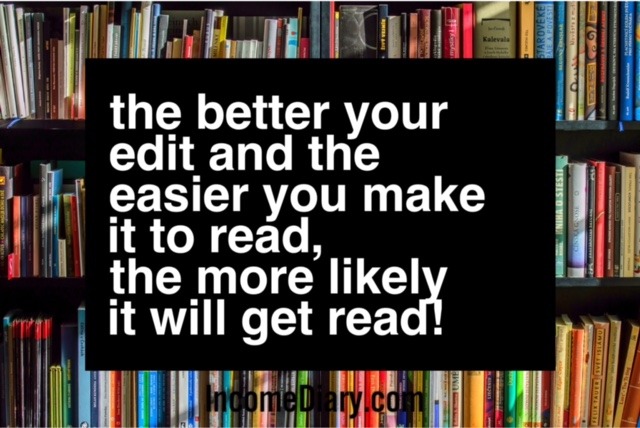
Useful online editing services:
Special Note: Some of these resources are targeted at academic writing – but that does not mean that us humble bloggers cannot get value out of them. Enjoy!
Grammarbook – especially for us bloggers who think we don’t have the time or quickly get bored with Grammar and Punctuation. When you should use dashes – and when you should not use dashes is a good example. Writers can also sign-up for Grammarbook’s free e-newsletter and access the expertise of Jane Straus, author of The Blue Book of Grammar And Punctuation.
Wordy – This source offers real-time, human copy-editing and proofreading support, and can elevate the accuracy and readability of any marketing content. Users simply submit an order, get an editor match and then have their work delivered within 20 minutes.
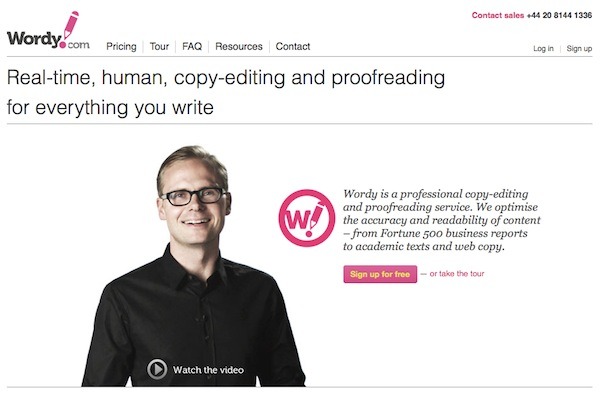
ProofreadBot – This straightforward and easy to use site offers writers a distraction-free zone where they can type directly on the webpage and receive immediate reports including suggested corrections, plagiarism checks, style and punctuation reviews.
NinjaEssays – This custom writing service offers 24/7 support and a first-time 15% discount, as well as access to one-on-one editing advice from MA or PhD holding writers. The service has overall affordable rates and can work with almost any deadline.
Papersgear – This writing service offers professional assistance and a convenient price checker. Simply enter in how many pages and additional details of your request, and receive an estimate before you pay. They also offer a 100% money-back guarantee and one-on-one expert editing and proofreading support.
EssayMama – This professional writing service is composed of qualified writers who can help with editing, proofreading, structure and research. And the site offers free writing guides and a blog full of useful tips as well.
EssayCapital – This writing service guarantees 100% originality and that each one of their writers holds either an MA or a PhD degree. The service delegates requests to writers who specialize in the specific area of study and offers affordable rates with some free features like outlining and formatting.
Reedsy – This network community of authors and publishers is an excellent way to gain access to top writers and editors. The site only accepts the top 1% of their applicants, offering some of the best guidance marketing content creators can find. Users can browse profiles, collaborate on projects and compare price quotes for free.
Often when writers proofread their own writing, it becomes natural to read your words, as they should sound in your mind. Even once reading out loud, writers can miss their own mistakes. It’s necessary to have an outside set of eyes, or automated grammar-check scan your work as well. If you have a friend or coworker who has good grammar skills, maybe they can help you out. Just be sure to give the process its due time before publishing.
Some writers enjoy the editing and proofreading processes, and others do not. It’s definitely something a marketing content creator needs to be able to focus on, and something that will consume a decent chunk of time. If you are on the side of the spectrum that dreads fine-tuning your marketing content, have no fear – technology is here.
Use the listed tips and online tools to start creating better content today. Once you begin seeing better impact results, you will start to increase your editing and proofreading productivity and hopefully begin enjoying the process. Whether you are a fan of it or not, it has to be done to achieve maximum results.
Recommended Reading:
Tips and advice from successful writers – including the best ways to get over the “blank page hurdle”
Bio: Anna Olinger is a freelance content manager from Washington, DC. To learn more tips on content marketing, writing and social media follow Anna on Twitter.
